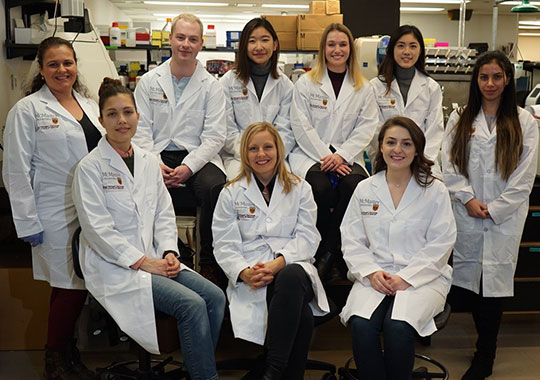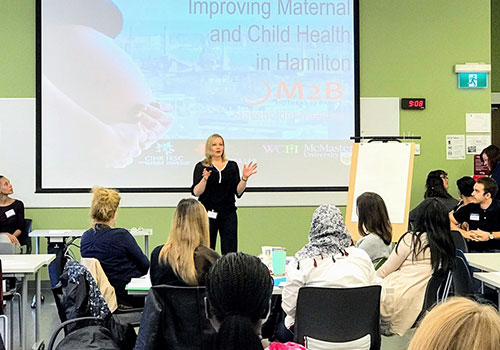Babies and Bacteria
McMaster researcher studies link between maternal nutrition, gut bacteria, and the health of babies

Dr. Sloboda, centre, with members of her lab
April 24, 2019
A researcher at McMaster University in Hamilton is seeking to uncover the link between maternal obesity and excess weight gain during pregnancy and increasing childhood obesity rates.
With the support of funding under CIHR's Healthy Life Trajectories Initiative (HeLTI), Dr. Deborah Sloboda's research focuses on how poor nutrition, stress, and other forms of maternal adversity affect the health of women and their developing babies.
A professor at McMaster University and a Tier 2 Canada Research Chair in Perinatal Programming, Dr. Sloboda is a leader in the field of Developmental Origins of Health and Disease (DOHaD), which is based on the theory that environmental factors acting during the earliest stages of life set the stage for disease risk later in life.
Through community outreach activities in her Mothers to Babies (M2B) Study, Dr Sloboda and her team, have engaged key stakeholders, including community care providers, public health, pregnant people and new moms to probe the knowledge, experiences, barriers, and supports related to nutrition and health during pregnancy.
This community-based project aims to transfer knowledge about the health benefits of improving early life environments, to those who can create appropriate policies and programs that would support the needs of women and their families. Interventions generated on the basis of findings from this study have the potential to create downstream impacts on health and social inequities.
"We find that although women have a high level of awareness of maternal nutrition guidelines," said Dr. Sloboda, "there's still very low awareness of the early origins of disease risk and how women's nutritional status during pregnancy affects the health of not just their babies, but the health of their children as adults."

Dr. Sloboda speaks at a Mothers to Babies stakeholder meeting
Dr. Sloboda and her team have also identified a wide range of barriers and issues influencing diet and health during pregnancy, as well as intervention strategies to initiate positive change. These influences span not only those with immediate impact on eating habits, but also social and environmental factors that led to impacts on nutritional status.
Alongside this, Dr. Sloboda and her team are studying the role of gut bacteria – how the relationships between adiposity, pregnancy weight gain and the maternal gut bacteria influence novel developmental pathways that mediate the early origins of childhood obesity and chronic disease. They are seeking to understand the biological pathways that regulate gut health and immunity in pregnancy, and whether these are impaired in pregnancies characterized by excess adiposity and how these relationships. As part of this, the team is exploring which interventions designed to influence diet during pregnancy could reduce these risks to the child.
"My research is really focused on improving the health of women," said Dr. Sloboda. "By providing supports to enable good health before and during pregnancy, we're helping women, their babies and their extended families, for many generations to come."
- Date modified: